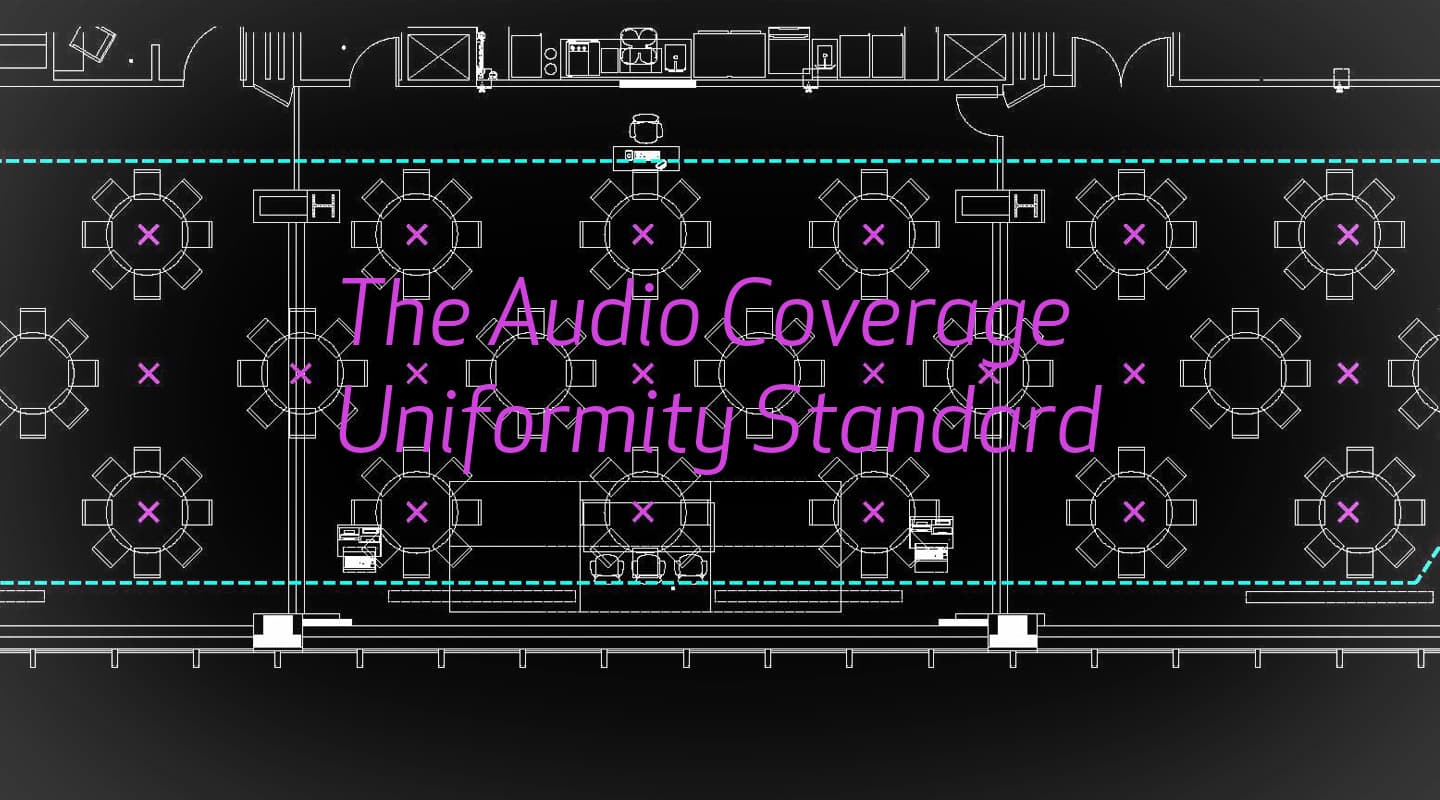
The Audio Coverage Uniformity Standard
What does it all mean?
Text/: Peter Swanson, CTS
For those of you who haven’t been bombarded by the mass media onslaught that is the InfoComm marketing machine, the first joint standard for InfoComm and ANSI was released in 2009. ANSI/INFOCOMM 1M:2009 Audio Coverage Uniformity is a performance standard that identifies the requirements for performance of loudspeaker systems from the perspective of uniformity across a nominated coverage area.
Those with an eye for detail will already have realised that you can achieve ACU compliance and still have poor intelligibility or a dodgy frequency response. Rome wasn’t built in a day and nor is a comprehensive suite of standards! ACU represents the first step along the path to a powerful set of standards to help us all guide the process of design, installation and commissioning of systems.
And, let’s be honest, many of us are unused to the process of understanding, adhering to and demonstrating compliance with installation standards. This is a great opportunity to familiarise ourselves with the standards process that is common in so many other areas of engineering.
So, let’s focus on what ACU means to our industry and how it can be of benefit to end users, designers and integrators.
As with any standard, one of the immediate benefits is, er… standardising what is delivered on a typical project.
20 PERSON CONFERENCE ROOM
The example assumes a distributed ceiling loudspeaker system on a 2.4m grid and ceiling height of 2.7m. With listener ear height at 1.2m, this gives a minimum grid of 1.5m (listener ear to loudspeaker above). The example also shows the use of separate coverage areas so that measurements are taken only where they are needed.
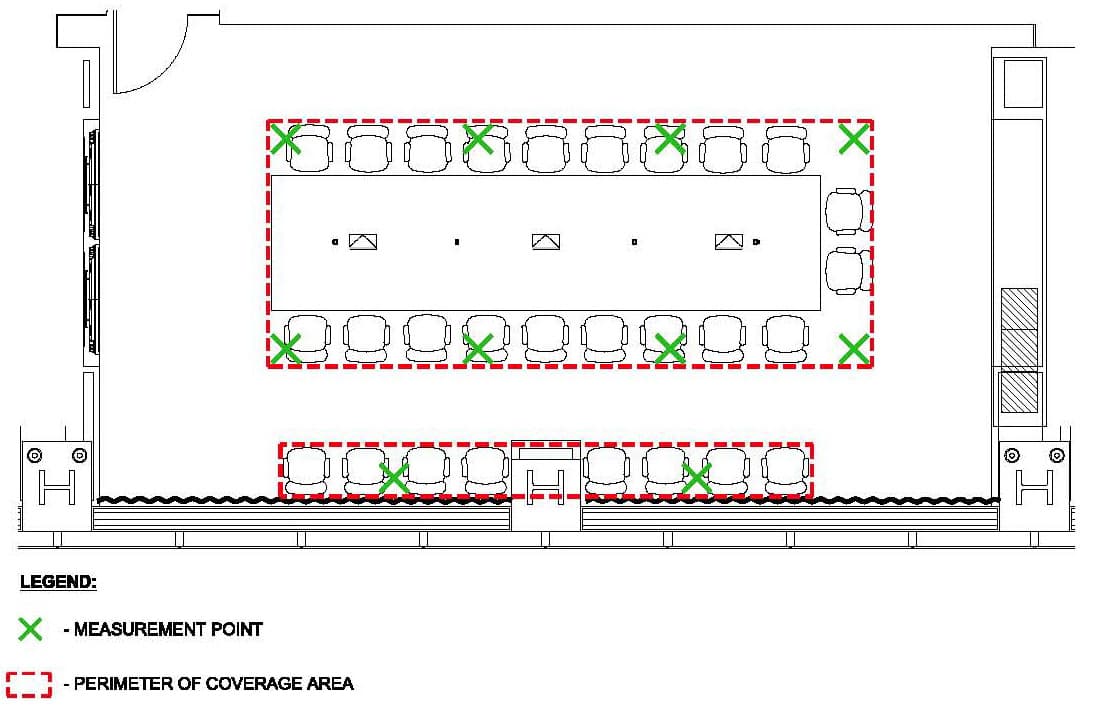
8 PERSON CONFERENCE ROOM
The example again assumes a distributed ceiling loudspeaker system on 2.4m grid and ceiling height of 2.7m. With listener height at 1.2m, this gives a minimum grid of 1.5m (listener ear to loudspeaker above).
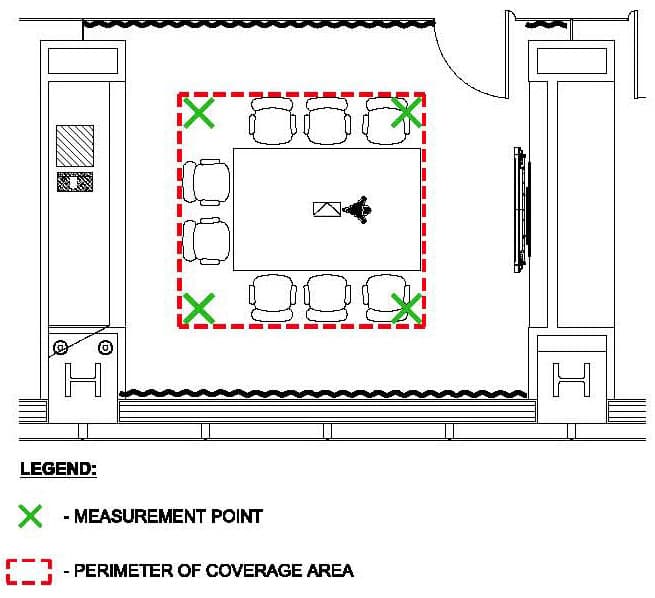
RAISING STANDARDS
Having a standard methodology helps at each stage of the process. For initial project discussions, it helps to set the scene – do you want your system to comply with international standards? If so, we need to expend appropriate budget on loudspeakers and amplifiers. If not, be prepared for a lower quality of performance.
We’ve all had that conversation, but having a standard to back you up lends a little more weight than just saying “because I told you so and I’m an expert”.
The standard itself is very much not a ‘design guide’. It doesn’t tell you to use ceiling speakers, line arrays, horns or clusters – you can still maintain your unique design approach and work with the architect’s aesthetic.
What it does do is call upon the integrator to complete a series of well defined measurements in order to demonstrate either ‘Conformance’, ‘Partial Conformance’ or ‘Non-Conformance’ with the standard.
In a nutshell, the standard says “In order to comply, you must have no more than 6dB of level variation across all measurement locations, in each of 6 ISO octave bands.” For the record, the bands nominated are 250Hz, 500Hz, 1000Hz, 2000Hz, 4000Hz and 8000Hz. For applications where a wider frequency response is required, you can also extend with an additional two bands – 125Hz and 16000Hz.
One of the areas of weakness in our industry is a lack of clearly identified expectations of what an integrator should present at handover. How do you demonstrate that the system has been effectively commissioned to meet the parameters defined by the client or the consultant? This is not a question that should be asked on every project, for every component – there should be standard methodologies in place. Now, for at least one element, there is.
I have already heard feedback from some leading members of the US AV industry on how positively use of ACU can impact on the handover process. It’s no guarantee of a perfect outcome, but going through the process does help!
But, how long does it take? Anecdotally, you are probably looking at 1 hour of measurement planning for a 1,000 seat hall and another 2-3 hours of measurement and documentation. In the context of such a project, this is a minimal overhead. The best way is to try it yourself – why not get a copy of the standard from the link to the ANSI online store via www.infocomm.org/standards and see how long it takes on your next project?
“”
If you call on the contractor to conform with ACU, you are effectively calling on them to test your design
CLASSROOM
The example assumes a distributed ceiling loudspeaker system on 2.4m grid and ceiling height of 2.7m. With listener ear height at 1.2m, this gives a minimum grid of 1.5m (listener ear to loudspeaker above). The example also shows the approach where the distance between perimeter grid points is less than 2 x grid dimension. A suggested optional centre measurement is shown in blue.
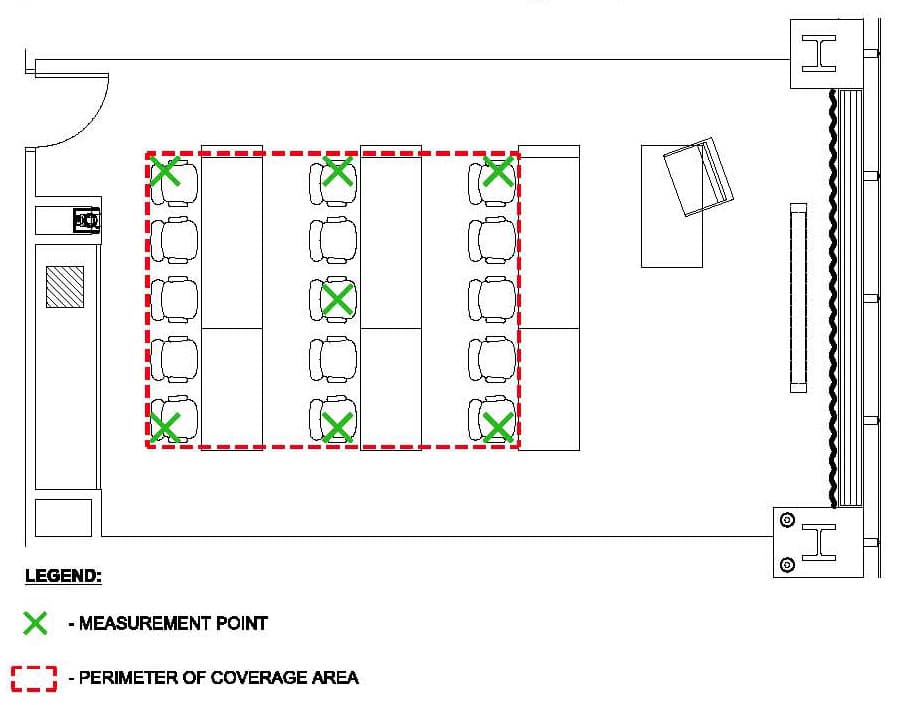
BOARDROOM
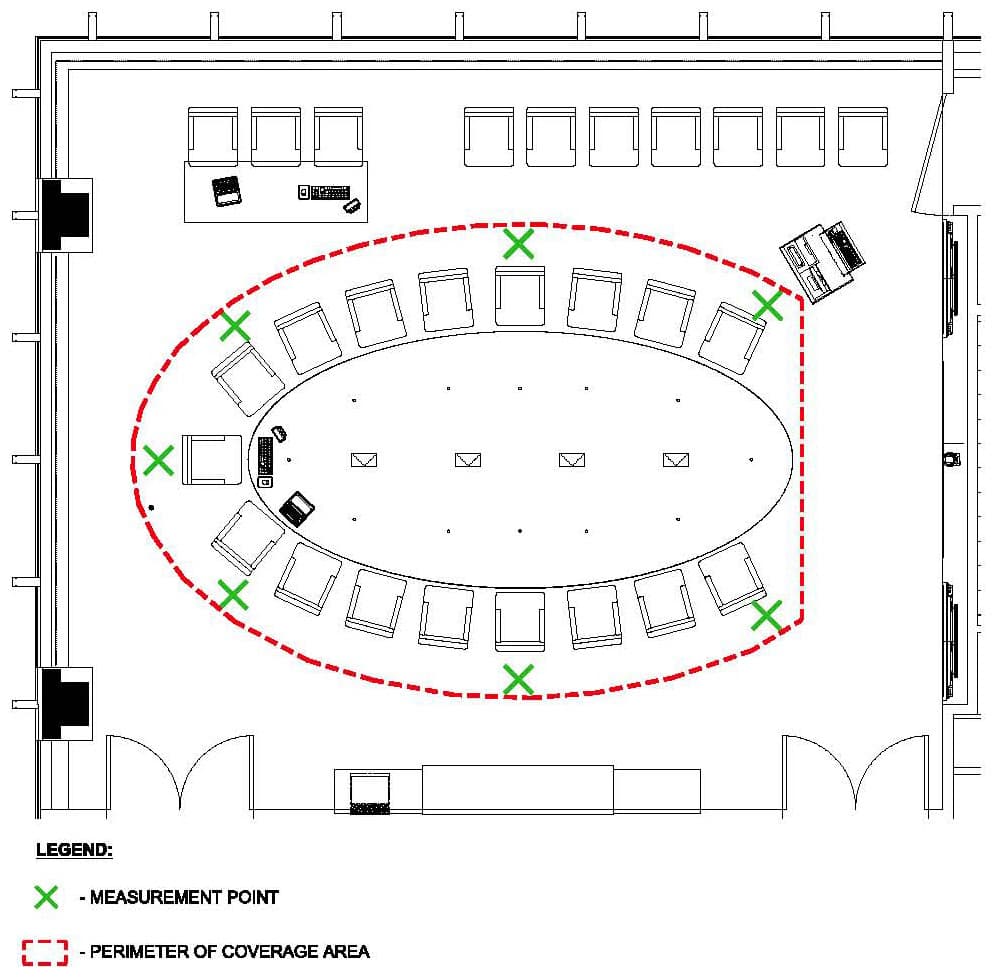
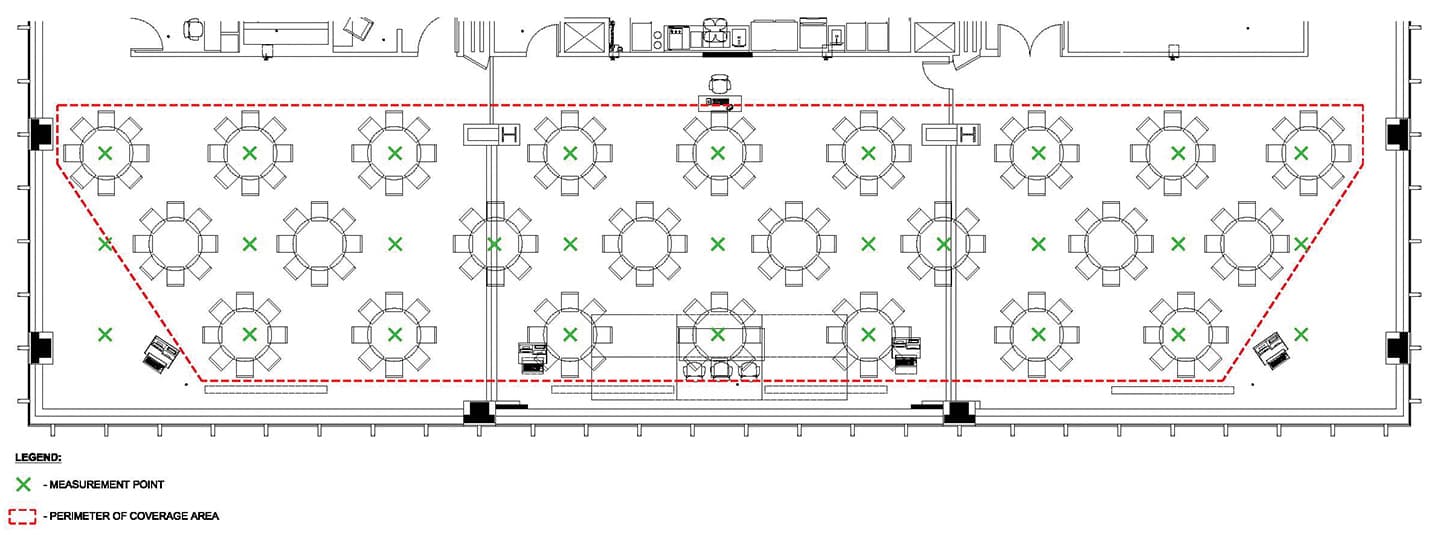
REACHING YOUR OWN STANDARDS
Now, for the consultants out there: a word of warning. If you call on the contractor to conform with ACU, you are effectively calling on them to test your design. I strongly recommend making sure you have verified your design through calculation or modelling prior to tender! The same as designing to achieve a certain Speech Transmission Index (STI) should increase the rigour of your design process, you will now need to make sure that the speakers you are selecting and placing will be capable of achieving ACU requirements.
Having said at the start of the article that ACU can’t guarantee good intelligibility or a uniform frequency response, it may actually be more help than you might first think. I am of course assuming that you’ve invested in a reasonable digital signal processor for your system and that your amplifiers are of a good professional standard. I’m not going to try and solve all the possible problems of the audio design world here, but I would suggest that more than an average number of issues stem from lack of consideration of uniformity of coverage. Therefore, if you get the coverage right it will help in getting you a baseline from which to achieve your goals for intelligibility and frequency response.
For those of you that made it to the last paragraph of another standards article without falling asleep, congratulations! I hope you feel suitably inspired to go and try out ACU as another weapon in your armoury for creating great projects for your clients. If you’re really excited (or you’ve had too many double espressos this morning), don’t forget that you too can get involved in international standards development – just send an email to standards@infocomm.org indicating your areas of focus/interest.













RESPONSES